On behalf of Water Policy Group and the UNSW Global Water Institute, Mr Tony Slatyer presented the Global Water Policy Reports during a side event at the 2023 High Level Political Forum in New York on 19 July.
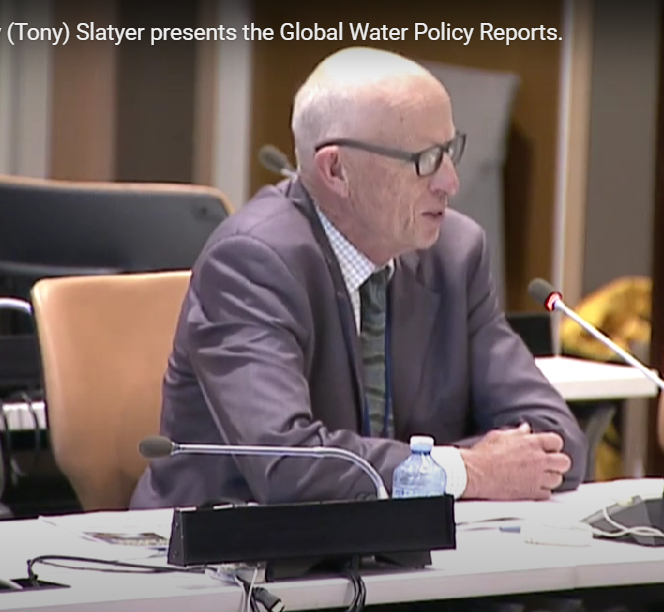
On behalf of Water Policy Group and the UNSW Global Water Institute, Mr Tony Slatyer presented the Global Water Policy Reports during a side event at the 2023 High Level Political Forum in New York on 19 July.
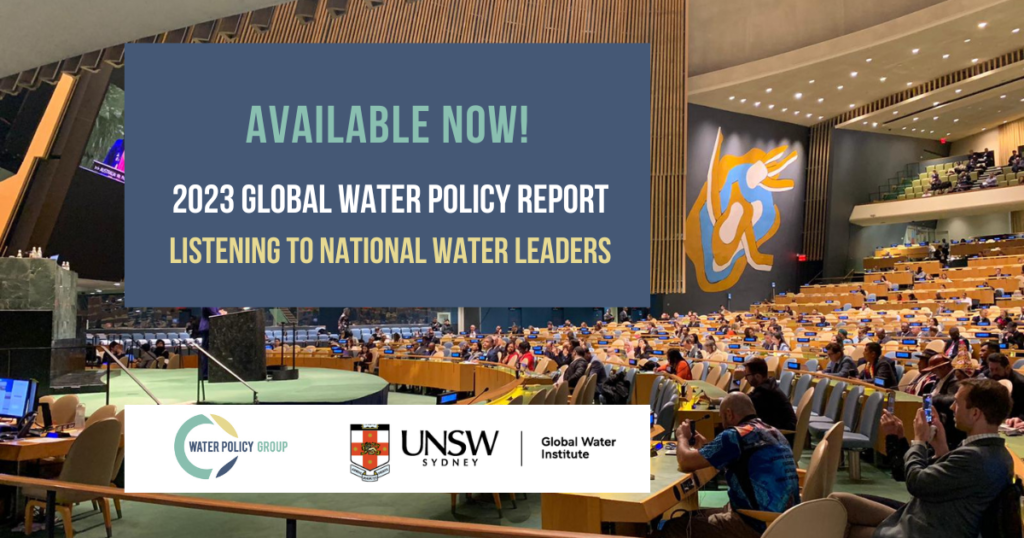
The 2023 Global Water Policy Report offers a fascinating glimpse into the thoughts, experiences and opinions of national water leaders from 92 countries, responsible for water policy and decision-making impacting a combined population of 5.7 billion people.
Released on Thursday 6 July by Water Policy Group, the 2023 Global Water Policy Report: Listening to national water leaders reveals insights from national water leaders on current water risks and challenges, how international processes can best support improved water outcomes at the national level, and issues of integration with other sectors.
Among their many messages, national water leaders are saying:
Water Policy Group member Tony Slatyer says, “Given the basic responsibility of governments for the well-being of the people under their jurisdiction, we are deeply interested in the experience and opinions of the Ministers and the senior officials who have this responsibility within governments. Policy makers and water practitioners in all countries and in all international organisations committed to improved water outcomes will also be interested in the particular and shared experience of these national water leaders.”
In 2022, invitations were sent by the President of the UN General Assembly (PGA) to all UN member States, through their UN New York-based Permanent Representatives, for Ministers responsible for water matters (or their top officials) to respond to the Water Policy Group survey. The key findings from the 2023 Global Water Policy Report helped to inform global dialogue at the United Nations 2023 Water Conference (22-24 March 2023), and the 2023 Water Policy Report sets out these findings in full.
The 2023 Global Water Policy Report: Listening to Water Leaders was prepared by the Water Policy Group in partnership with the University of New South Wales Sydney Global Water Institute.
Water Policy Group
6 July 2023
Water Policy Group congratulates member Dr Olcay Ünver on his receipt of the 2023 International Water Resources Association (IWRA) Crystal Drop Award, given for his outstanding and impactful contributions to the global water sector.
The IWRA Crystal Drop Award is bestowed upon organisations or individuals in recognition of their laudable contributions to the improvement of the world’s water situation. Awarded only every three years, it represents the highest level of recognition by IWRA and is one of the most esteemed awards available to individuals within the global water community.
In addition to being a valued member of Water Policy Group, Dr Ünver is currently Professor of Practice at Environmental and Resource Management Programme; Senior Global Futures Scientist at Wrigley Global Futures Laboratory; and Adjunct Faculty at Melikian Center at Arizona State University. He is also Industry Fellow at Australian Rivers Institute and serves as senior advisor to Food and Agricultural Organisation of the United Nations and UNESCO.
In his public service career spanning over three decades, he served as Vice-Chair of UN-Water, led FAO’s water programmes and activities, and UNESCO’s World Water Assessment Programme. Earlier, he was a distinguished Professor at Kent State University, Ohio. In his home country, Turkey, he was President of the Southeastern Anatolia Project (GAP), where he transformed an engineering project of dams, power plants and irrigation systems into a sustainable human development programme integrating social development, employment creation, gender equality and environmental sustainability with infrastructure investments, which earned an IWRA Millennum Award.
Fellow Water Policy Group member Tony Slatyer congratulated Dr Ünver on behalf of the Group, saying, “We are so pleased with this recognition of Olcay’s tireless work in global water affairs. He is both a total professional and an enthusiast for the cause of improved water outcomes everywhere. We also acknowledge and warmly thank Olcay for his commitment and contribution to our Global Water Policy Reports, the 2023 edition of which is about to be published.”
The winners will officially receive their awards at a celebration during the XVIII World Water Congress in Beijing, China (September 11-15, 2023). A second IWRA Crystal Drop Award will be presented to the Korea Water Resources Corporation (K-Water), for its contributions to global efforts in addressing water scarcity, promoting water security, and implementing efficient water management practices.
Water Policy Group
28 June 2023
Media enquiries: Trish Dalby | p.dalby@unsw.edu.au

Water Policy Group member Anne Castle – former assistant secretary of the Interior for Water and Science and a Colorado River veteran – has written the foreword for a new book titled Living River – The Promise of the Mighty Colorado. The book explores the endangered Colorado River from source to sea with conservation photographer Dave Showalter, using powerful visual storytelling to illustrate how we can create a resilient watershed if we change our relationship with water.
A section of the foreword is shared below and the book is now available for purchase through Mountaineers Books.
“The Colorado River is a waterway of superlatives—the most volatile supplies, the most iconic landscapes, the most dammed, the most litigated, and, lamentably, the most threatened. It is also a river of contrasts, encompassing thriving cities juxtaposed with large swaths of rural areas where many households lack clean drinking water, whitewater rapids providing challenge and recreation upstream of a dried-up estuary, and lush and lucrative farmland whose very viability is threatened by diminished supplies […] Imagery provides a visceral understanding of the value of this river. It deepens our sense of community and stimulates appreciation for the many ways in which this river is loved—and being loved to death. These stunning pictures and the stories that accompany them offer touchstones of understanding of the river’s dilemma and furnish a foundation for a stronger commitment to sustainability.”
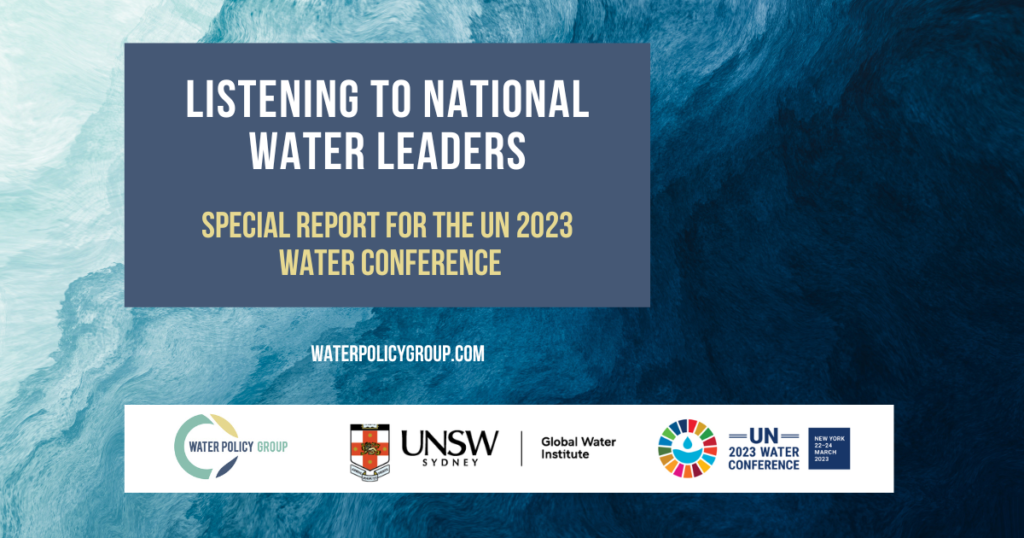
Water Policy Group has released key findings from its latest ‘Listening to National Water Leaders’ survey, as a contribution to the UN 2023 Water Conference (22-24 March 2023).
The results provide insights from water leaders about how the United Nations and other international processes can help achieve water outcomes at the country level.
Water leaders from 92 countries across all regions participated in this project. Together, these countries make up a combined population of 5.7 billion—or 73% of the world’s population. The findings are now available for all UN member States and other entities to use as they prepare for the UN 2023 Water Conference.
Water Policy Group
14 March 2023
Media enquiries: Trish Dalby | p.dalby@unsw.edu.au
Water Policy Group proposes a new approach to help policy-makers solve the most sensitive water management issues.
The idea of global ‘scaffolding’ for water policy is to assist governments to work through difficult water management decisions using global principles and guidance agreed through an inclusive inter-government and multi-stakeholder process.
Water Policy Group offers the concept for consideration by the United Nations 2023 Water Conference (New York 22-24 March 2023).
Water Policy Group
14 March 2023
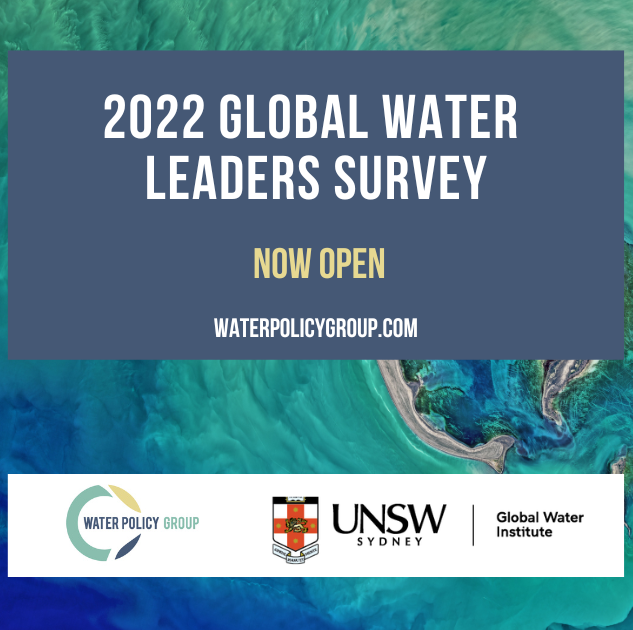
The 2022 Global Water Leaders Survey has been formally launched by Water Policy Group following a meeting convened by the President of the United Nations General Assembly (UN PGA) in New York on 24 October 2022.
Addressing the meeting, Water Policy Group member Olcay Ünver described how the results of the 2022 Global Water Leaders survey would contribute to the outcomes of the United Nations 2023 Water Conference, which is the midterm comprehensive review of the implementation of the International Decade for Action, ‘Water for Sustainable Development’, 2018-2028.
“Water Policy Group offers to support the United Nations 2023 Water Conference by drawing on the collective experience and perspective of Ministers and national water leaders with specific goal of contributing to the substance of Water Action Agenda and Water Action Decade, and improving alignment between water and other public policy outcomes,” said Mr Ünver.
In partnership with the University of New South Wales Global Water Institute, the 2022 Global Water Leaders Survey will gather thoughts and opinions from national water leaders from all over the world, feeding into the 2023 Global Water Policy Report. The Report will provide valuable insights into how water could be made a higher priority within national governments, how multilateral processes could help to achieve better water outcomes at the national level, and the level of agreeance between ministerial colleagues on the extent to which water outcomes contribute to other public policy objectives. The Report will also include a section on risks and challenges that impact national water leaders, building on the results of the previous survey to secure a deeper dataset and perspective—and identify whether key risks and challenges have evolved over the past year.
The inaugural Water Policy Report, the 2021 Global Water Policy Report: Listening to Water Leaders was released in November 2021, reflecting data from water leaders from 88 countries. Among the many findings, it revealed that the Sustainable Development Goalson water were ‘challenging’ or ‘impossible’ for many, with governance problems and lack of financing the main reasons for this.
Upon publication of the 2021 Report, then UN-Water Vice-Chair Ms Kelly Ann Naylor expressed her support, saying, “By surveying water leaders from all regions of the world, this report is a key point of reference as we move towards the UN 2023 water conference.”
Water Policy Group member and project Chair Mr Tom Soo said that the Group is encouraged by the support received so far.
“The 2023 conference is a major opportunity for nations around the world to collectively take a step forward in facing our water challenges,” said Mr Soo.
“Water Policy Group is extremely encouraged that the UN PGA and all those involved in the conference’s preparatory processes understand the importance of and support the water leader’s survey. We’ll now look forward to the responses from water leaders around the world and delivering the findings in the leadup to the water conference next year.”
Water ministers of all UN Member States will be invited to participate in the 2022 Survey, which will close in mid-December.
The 2023 Global Water Policy Report and a summary of key findings will be released at the UN 2023 Water Conference in New York on 22-24 March 2023.
Questions about eligibility and survey access can be directed to info@waterpolicygroup.com.
Water Policy Group
23 November 2022
Water Policy Group urges all governments to integrate action on water and climate change at every level and calls on experts and organizations to support this ambition.
We echo this week’s statement by Water and Climate Leaders which challenged governments to acknowledge in the negotiated outcome document for COP27 the important contribution water can make to climate mitigation and adaptation.
We also welcome the release of Essential Drop To Net Zero: Unpacking Freshwater’s Role In Climate Change Mitigation and its detailed analysis of how improved water management can contribute to emission reductions and in doing so deliver multiple other benefits. The report finds that wastewater treatment and discharge account for 11.84 per cent and 4.28 per cent of global methane and nitrous oxide emissions, respectively, and that emissions from untreated wastewater are three times higher than emissions from conventional wastewater treatment plants. These climate benefits should enhance the investment case for improved wastewater management—adding to the proven economic, social and environment benefits.
Water can be managed to achieve higher climate resilience with adaptation interventions throughout the water cycle, lowering energy demand, boosting sustainable agriculture, and improving health. The WPG urges commitment to innovative water policies to enable the full realization of SDG6 while pursuing Paris Agreement goals.
The climate emergency requires water resources and water services to be better managed than ever before. This can and must be done!
Water Policy Group
10 November 2022
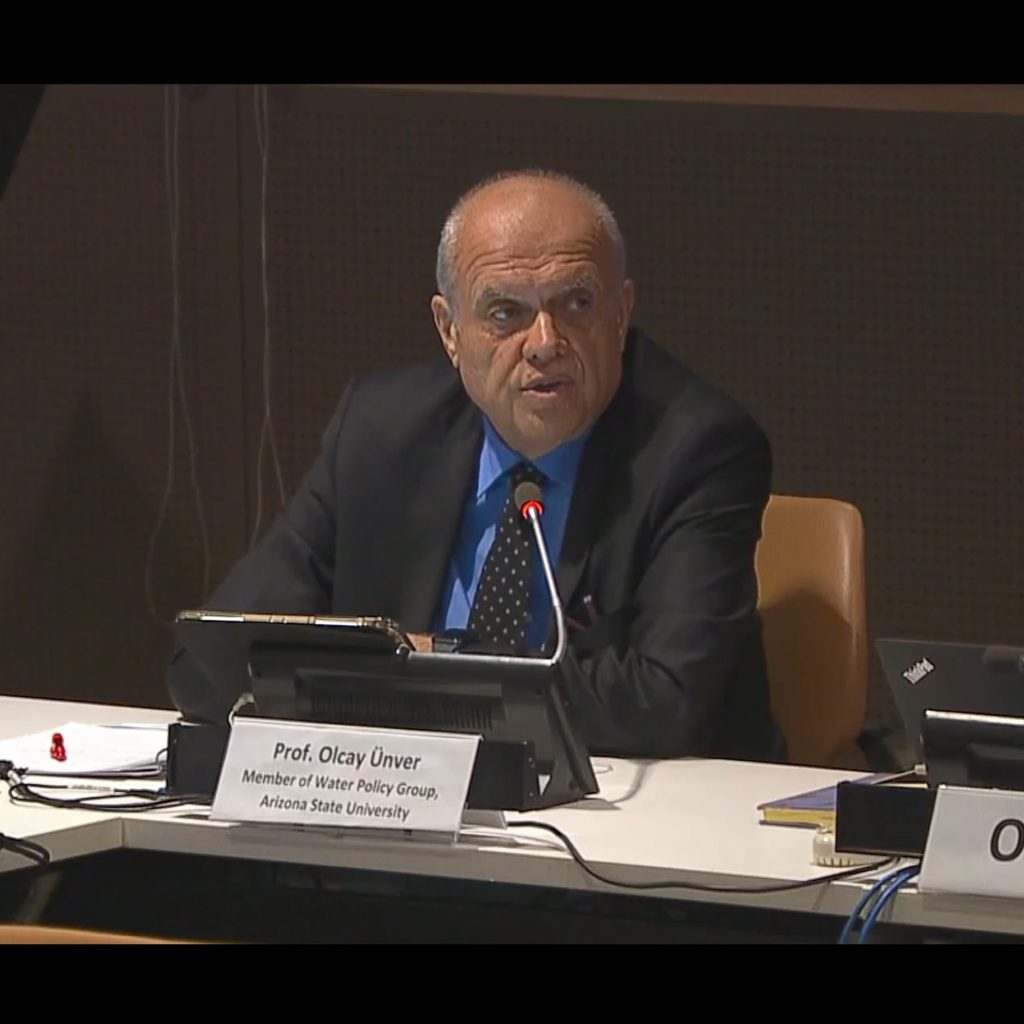
On behalf of the Water Policy Group, Dr Olcay Ünver made an address during the 2022 stakeholder consultation on the preparation of the United Nations 2023 Water Conference. He presented two game-changing proposals on behalf of the Water Policy Group: (1) listening to national water leaders, and (2) mainstreaming water into all UN conferences.
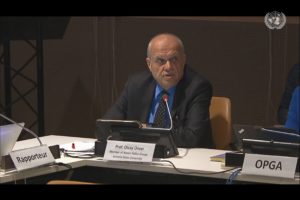
The water leaders survey proposed in this concept note is intended to assist all relevant stakeholders (UN member states, inter-governmental organisations, civil society organisations and other non-state actors) to accelerate progress in achieving water objectives by informing discussions at the United Nations 2023 Water Conference.